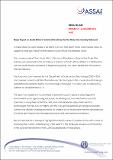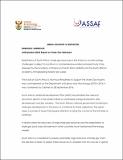| dc.contributor.author | Academy of Science of South Africa (ASSAf) | |
| dc.date.accessioned | 2016-10-06T10:01:43Z | |
| dc.date.available | 2016-10-06T10:01:43Z | |
| dc.date.issued | 2016 | |
| dc.identifier.citation | Academy of Science of South Africa (ASSAf), (2016). South Africa’s Technical Readiness to Support the Shale Gas Industry. [Online] Available at: DOI http://dx.doi.org/10.17159/assaf.2016/0003 | |
| dc.identifier.isbn | 978-0-9946852-7-8 | |
| dc.identifier.other | http://dx.doi.org/10.17159/assaf.2016/0003 | |
| dc.identifier.uri | http://hdl.handle.net/20.500.11911/14 | |
| dc.description | Cite: Academy of Science of South Africa (ASSAf), (2016). South Africa’s Technical Readiness to Support the Shale Gas Industry. [Online] Available at: DOI http://dx.doi.org/10.17159/assaf.2016/0003 | |
| dc.description.abstract | The consensus report titled South Africa’s Technical Readiness to Support the Shale Gas
Industry was produced by the Academy of Science of South Africa (ASSAf), in collaboration
with the South African Academy of Engineering (SAAE). The report details the interventions
that are required.
The study was commissioned by the Department of Science and Technology (DST) in 2014
and assesses current available information and technologies in the country should shale gas
exploitation be implemented to counter energy challenges. The report was considered by
Cabinet on 28 September 2016.
The report concludes that much needs to be done to put in place a clear legislative
environment and a rigorous regulatory and monitoring structure which will ensure that
operators, in using their exploration and production licences, apply best-practice
technologies that are fully compliant with the rules and regulations governing the industry.
It states that decision-making processes on whether or not to proceed with the development
of a shale gas industry must be based on robust and peer-reviewed evidence.
Recommendations in the report highlight the need for several baseline studies with a view to
improving the current understanding of the extent of the shale gas resources and the status
of the local environment in which such developments will take place.
Celebrating 20 years (1996 – 2016)
in the service of society
A key recommendation is that relevant departments, with DST oversight, should initiate a
major project to undertake, prior to the commencement of shale gas
exploration/exploitation, robust multidisciplinary, regional and local baseline studies.
A major priority for the technical readiness of South Africa to implement a shale gas industry is
the need to establish processes to continuously and accurately monitor key factors which will
impact on the sustainability of the industry.
Another requirement is that interventions are made to ensure that the requisite skills and
infrastructure required to implement such an industry are available.
The Hydraulic Fracturing Monitoring Committee is encouraged to take immediate steps to
establish a new, or strengthen an existing, government agency whose overall function is, inter
alia, to enable and facilitate the development of the shale gas industry in South Africa.
Assessment of the economic implications of shale gas development for South Africa must be
undertaken to critically assess the supply-demand situation, and comprehensive public
consultation and engagement processes with local communities in the Karoo are
emphasised.
Of major importance to South Africa’s groundbreaking scientific endeavours on the Square
Kilometre Array (SKA) project, the report recommends that any legislation that is introduced
to have oversight of the shale gas industry must be fully aligned with the Astronomy
Geographic Advantage Act, and that no hydraulic fracturing should take place within a 30
km buffer zone of an SKA site. | |
| dc.description.sponsorship | Department of Science and Technology. South Africa. | |
| dc.language.iso | en | en_ZA |
| dc.publisher | Academy of Science of South Africa | en_ZA |
| dc.subject | Fracking | en_ZA |
| dc.subject | Karoo | en_ZA |
| dc.subject | Hydraulic fracturing | en_ZA |
| dc.subject | Eastern Cape | en_ZA |
| dc.subject | Northern Cape | en_ZA |
| dc.subject | Western Cape | en_ZA |
| dc.subject | Gas industry | en_ZA |
| dc.subject | Technology | en_ZA |
| dc.subject | Research | en_ZA |
| dc.subject | Baseline studies | en_ZA |
| dc.subject | Regulation | en_ZA |
| dc.subject | Geology | en_ZA |
| dc.subject | Geohydrology | en_ZA |
| dc.subject | Biodiversity | en_ZA |
| dc.subject | Landscape | en_ZA |
| dc.subject | Water | en_ZA |
| dc.subject | Emissions | en_ZA |
| dc.subject | Square Kilometer Array | en_ZA |
| dc.subject | Electromagnetic | en_ZA |
| dc.subject | Capacity development | en_ZA |
| dc.subject | Socio-economic | en_ZA |
| dc.subject | Drilling | en_ZA |
| dc.subject | Casings | en_ZA |
| dc.subject | Best practice | en_ZA |
| dc.subject | Sustainable Development Goals (SDGs) | |
| dc.subject | SDG 7 | |
| dc.subject | SDG 8 | |
| dc.subject | SDG 9 | |
| dc.subject | SDG 11 | |
| dc.subject | SDG 13 | |
| dc.subject | SDG 16 | |
| dc.title | South Africa’s Technical Readiness to Support the Shale Gas Industry | en_ZA |
| dc.type | Consensus Study Report | en_ZA |
| dc.identifier.doi | 10.17159/assaf.2016/0003 | |
| assaf.peer-review.status | Peer-Reviewed | |



